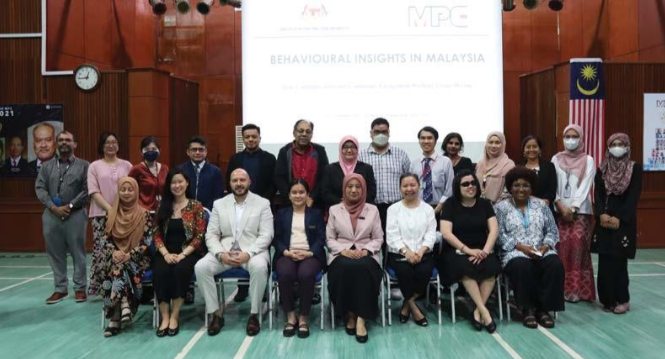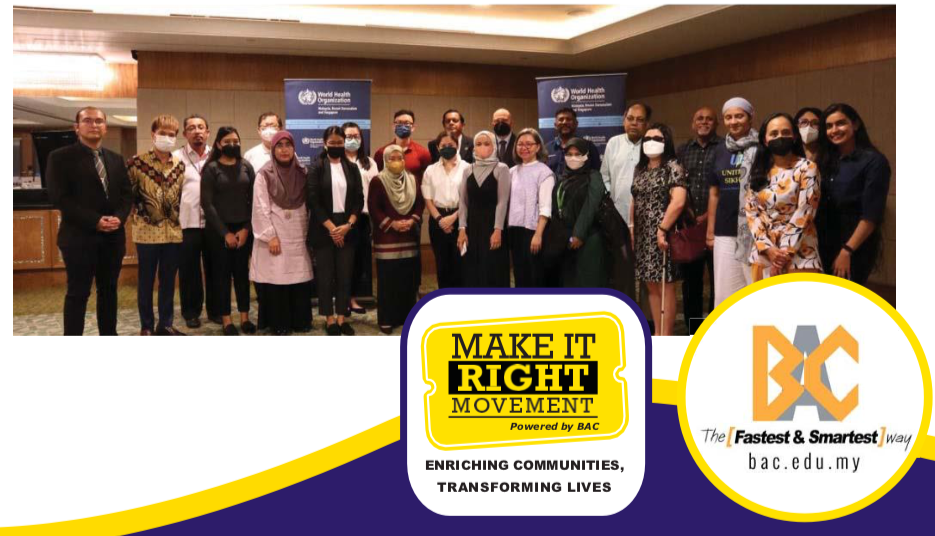Risk Communication and Community Engagement (RCCE) Meetings by MIRM

As the world grapples with increasingly complex health challenges, the need for clear, accessible and inclusive communication has never been more critical. To address this need, the World Health Organisation (WHO) initiated a series of Risk Communication and Community Engagement (RCCE) meetings, aimed at ensuring that vulnerable communities receive accurate health information and can engage meaningfully in public health efforts. In 2022, the Make It Right Movement (MIRM) became a key partner in these meetings, working alongside WHO to connect Malaysia’s underserved populations with vital health resources, particularly in the context of the COVID-19 pandemic.
The RCCE meetings brought together various stakeholders, including NGOs, healthcare professionals, community leaders and international organisations, with the shared goal of improving the dissemination of health information and fostering trust between communities and public health authorities. For MIRM, this partnership offered a unique opportunity to amplify its ongoing efforts in health communication, especially in marginalised and vulnerable communities.
The Importance of Risk Communication and Community Engagement
In times of crisis, such as pandemics or natural disasters, effective communication is crucial to ensuring public safety. However, delivering health information to diverse communities with varying levels of access, literacy and trust in authorities can be a significant challenge. Risk communication involves conveying information about potential health risks in a way that is clear, accurate and actionable, while community engagement focuses on involving the public in the decision-making processes that affect their health and safety.
Together, RCCE plays a vital role in building community resilience, encouraging behavior that reduces health risks and fostering a collaborative approach to crisis response. When done well, RCCE helps reduce misinformation, alleviate fears and empower communities to take control of their health.
MIRM’s Role in RCCE
MIRM, known for its commitment to uplifting marginalised communities, became an important partner in WHO’s RCCE efforts in Malaysia. The movement’s deep roots in the local community and its experience in bridging gaps between underserved populations and essential services made it a natural fit for the RCCE meetings.
As part of its role, MIRM focused on the following key areas:
Delivering Accessible Health Information: MIRM’s expertise in communicating with vulnerable groups, including those who speak different languages or face barriers to traditional media, was critical in ensuring that health messages reached all segments of society. In collaboration with WHO, MIRM helped produce and distribute COVID-19 resources—such as videos, posters and infographics—in multiple languages, including Tamil, Mandarin and indigenous languages. These materials were designed to be easy to understand, with a focus on visual aids and simple language to overcome literacy barriers.
Tailoring Communication for Vulnerable Groups: MIRM played a vital role in tailoring health communication to meet the specific needs of various groups, such as people with disabilities (PWDs), refugees and rural communities. Recognising that different communities have different concerns and challenges, MIRM ensured that health messages were culturally sensitive and relevant. This involved not only translating materials but also framing information in a way that resonated with the values and experiences of each community.
Community Engagement through Local Leaders: One of the core strategies employed by MIRM was engaging local community leaders to act as trusted intermediaries between public health authorities and their communities. By involving religious leaders, village heads and other respected figures in the communication process, MIRM helped foster trust and encouraged community members to take public health advice seriously. This approach was particularly effective in countering vaccine hesitancy and dispelling myths about COVID-19.
Training for Community Leaders: MIRM also conducted training sessions for community leaders, equipping them with the skills and knowledge to share health information effectively within their communities. These leaders were trained on how to communicate complex health messages in simple terms, respond to concerns and questions and promote health behaviors that reduce the risk of COVID-19 transmission. This grassroots-level engagement proved crucial in ensuring that health information reached even the most isolated communities.
Key Topics Addressed in RCCE Meetings
The RCCE meetings, held virtually and in person, addressed several key health topics, with a strong focus on COVID-19-related communication. Some of the main areas of discussion included:
COVID-19 Vaccination: One of the primary focuses of the RCCE meetings was promoting the uptake of COVID-19 vaccines, particularly in communities with low vaccination rates. MIRM worked closely with WHO to develop materials that explained the benefits of vaccination, addressed common concerns and countered misinformation about vaccine safety and efficacy.
Post-Vaccination Care and Monitoring: In addition to encouraging people to get vaccinated, MIRM also helped provide information on what to expect after receiving the vaccine, including potential side effects and how to monitor symptoms. This information was crucial in helping communities feel informed and reassured about the vaccination process.
COVID-19 Prevention Measures: Throughout the pandemic, clear communication about prevention measures—such as mask-wearing, handwashing and physical distancing—was essential. MIRM’s role in reinforcing these messages, especially in communities with limited access to healthcare, helped reduce the spread of the virus and protect vulnerable populations.
Building Community Trust: A recurring theme in the RCCE meetings was the need to build and maintain trust between communities and public health authorities. MIRM’s involvement in this area was invaluable, as the organisation has long-standing relationships with many of the communities most at risk. By working with trusted local figures and delivering messages in a culturally appropriate manner, MIRM helped foster a sense of collaboration and trust in public health interventions.
The Impact of RCCE in Malaysia
The RCCE meetings, supported by MIRM’s community engagement efforts, had a significant impact on Malaysia’s pandemic response. By focusing on vulnerable communities, the initiative ensured that those who were most at risk were not left behind in the fight against COVID-19.
Some of the key outcomes of MIRM’s involvement in RCCE included:
- Increased Vaccine Uptake: Through its tailored communication efforts, MIRM was able to address vaccine hesitancy in several communities, leading to higher vaccination rates among groups that were initially reluctant or uninformed.
- Improved Health Literacy: MIRM’s work in disseminating health information contributed to improved health literacy among vulnerable populations. Community members became more knowledgeable about COVID-19, how it spreads and the importance of preventive measures.
- Stronger Community Networks: By engaging local leaders and fostering community-based approaches to health communication, MIRM helped strengthen social networks that can be leveraged in future public health efforts.
- Reduction of Misinformation: MIRM’s culturally sensitive and accessible communication materials played a critical role in combating misinformation about COVID-19, helping communities make informed decisions based on reliable data.
Looking Ahead: Beyond the Pandemic
While the RCCE meetings were initially focused on COVID-19, the principles of risk communication and community engagement remain relevant for a wide range of public health issues. Moving forward, MIRM plans to continue working with WHO and other partners to apply these principles to other areas of health communication, such as mental health, vaccination for other diseases and emergency preparedness. The success of the RCCE meetings in Malaysia demonstrates the power of community engagement in promoting public health. By working closely with communities, respecting their unique needs and building trust, organisations like MIRM are helping to create a more resilient, informed and healthy society.
The WHO Risk Communication and Community Engagement (RCCE) meetings, supported by MIRM’s on-the-ground efforts, were instrumental in ensuring that marginalised and vulnerable communities in Malaysia received the critical health information they needed during the COVID-19 pandemic. Through culturally tailored communication, community engagement and the mobilization of local leaders, MIRM helped bridge the gap between public health authorities and underserved populations, promoting trust and cooperation in the face of a global health crisis.
As the world continues to face evolving health challenges, the lessons learned from these RCCE efforts will serve as a blueprint for how to engage communities, reduce health risks and ensure that no one is left behind.

